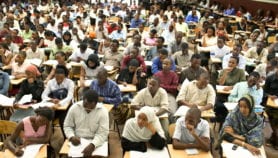Send to a friend
The details you provide on this page will not be used to send unsolicited email, and will not be sold to a 3rd party. See privacy policy.
The British prime minister Gordon Brown has called on the global scientific community to apply its "creative genius and innovative flair" to solving the technological challenges facing the world’s poorer countries, and help train their future researchers.
In a speech to the United Nations in New York this week (30 July), Brown also proposed that a public-private partnership approach — currently being used to provide mass immunisation for children — be extended to education, economic development and the environment.
And he argued that wealth creation, nurtured by supportive government policies and drawing on the potential of science, technology and innovation to boost economic growth and reduce unemployment, should be placed closer to the heart of poverty reduction strategies.
Brown used the address to lay out his global poverty strategy — developed during his ten years running Britain’s economy as Chancellor of the Exchequer.
He urged UN member states to increase their efforts to help developing countries meet the Millennium Development Goals, pointing out that we are half way towards their deadline — 2015 — but "the reality is that we are a million miles away from success".
Brown said that previous generations could blame their failure to tackle global poverty on a lack of knowledge, technology, medicine, science and wealth when, today, the developed world possesses all of these.
"What we now need is the unity and strength of purpose to employ the ingenuity and resources we have — and to employ them well — to help those who need it," he said.
He added, "Perhaps for too long we have talked the language of development without defining its starting point in wealth creation — the dignity of individuals empowered to trade and be economically self sufficient."
Brown called for a "new global alliance for peace and prosperity" to achieve these goals. He suggested that organisations across the social spectrum — from the scientific and engineering communities to nongovernmental organisations and private corporations — should explore and develop new methods of cooperation.
He cited the International Finance Facility for Immunisation — a programme backed by the Bill and Melinda Gates Foundation, six European governments, Brazil and South Africa — which aims to immunise 500 million children by 2015, as a good example of cooperation.
"The principle is that by investing money now in addressing the causes of poverty and underdevelopment, we save money that we would have to spend later on addressing the symptoms."
Link to full speech by Gordon Brown to the United Nations
More on MDGs
News
India’s shift to inclusive innovation is ‘a model to follow’
[CAPE TOWN] A leading Indian scientist and policymaker is calling on developing countries to adopt a ...03/01/13
News
Donors renew programme for African women researchers
[NAIROBI] Funders have renewed support for African Women in Agricultural Research and De ...12/11/12
News
More detailed data ‘needed to tackle hunger in Mali’
Using data from national household surveys could lead to a more accurate identification of09/05/12
News
African water atlas launched in French
[ABIDJAN] The UN Environment Programme (UNEP) has published a French version of its 'Africa Wat ...27/09/11
News
Fellowships for African women scientists a big hit
[NAIROBI] The African Women in Agricultural Research and Development (AWARD) fellowship programme has ...07/09/11
Opinion
Market approach to aid ‘means death for millions’
Even though aid alone can't solve all Africa's problems, it und ...31/10/07
Opinion
Time for a grand re-think of grand aid plans
Aid donors should re-think their self-appointed role as saviours of the poor, and try more mod ...20/09/07
Opinion
Developing countries need support to tackle MDGs
Developing countries need to strengthen their statistical systems to produce quality data for monitoring th ...27/04/07
News
UN hunger targets may increase water burden
If developing countries are to meet the UN Millennium Development Goals (MDG) to eradicate hunger, cr ...13/04/07




